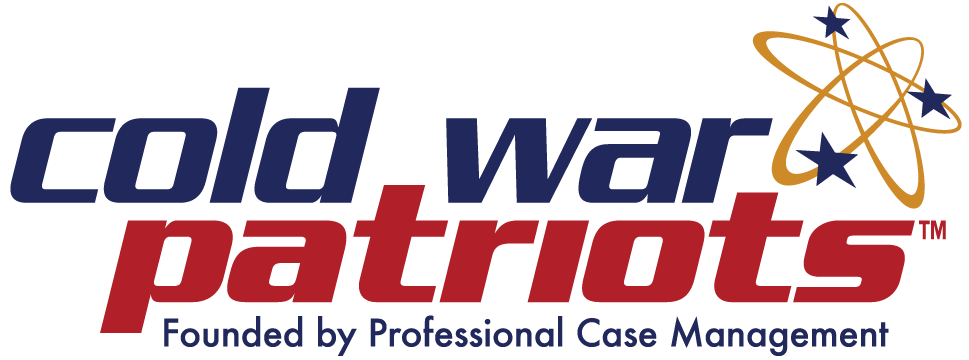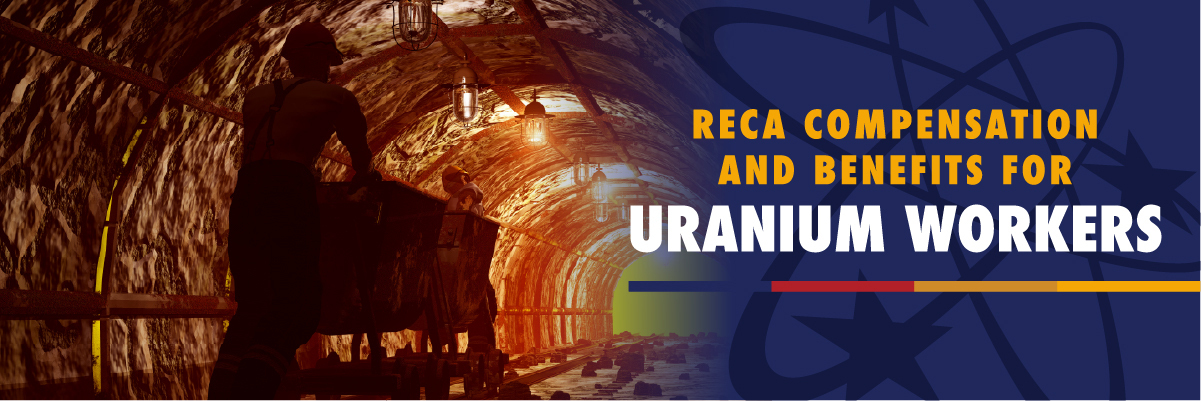
RECA
NEWLY EXPANDED RECA PROGRAM FOR URANIUM WORKERS
The U.S. Congress established the Radiation Exposure Compensation Act (RECA) in 1990. In July of 2025, new legislation was passed that expanded RECA to provide compensation and health benefits to more uranium workers.
The purpose of RECA is to provide benefits to:
- Uranium miners, millers, haulers, core drillers, and remediation workers who have developed certain cancers or certain respiratory or kidney diseases. To be eligible, you must have been employed for at least one year from January 1, 1942, through December 31, 1990. The compensation amount is $100,000.
- People who were on site during one of approximately 200 atmospheric nuclear weapon tests between 1945 and 1962 and have become sick. The compensation amount is $100,000.
- People who were physically present in certain counties downwind of the Nevada Test Site for at least two years from January 21, 1951, through October 31, 1958. Downwinder counties include the entire state of New Mexico, Utah, Idaho and large portions of Nevada and Arizona. These individuals are eligible if they have been diagnosed with specific types of cancer. The new compensation amount is $100,000 for successful new RECA claims. Unfortunately, previously paid claimants are not eligible for new compensation.
Uranium workers must have worked in one of these states: Arizona, Colorado, Idaho, New Mexico, North Dakota, Oregon, South Dakota, Texas, Utah, Washington, or Wyoming. To be eligible for compensation, they must have received a diagnosis of primary lung cancer, pneumoconiosis, pulmonary fibrosis, cor pulmonale, or a non-malignant respiratory disease. All uranium workers can also now qualify if they have been diagnosed with kidney cancer or kidney diseases and meet RECA’s eligibility requirements.
On-site participants include Pacific test sites, the Nevada test site, the South Atlantic test site, and the Trinity test site.
An entirely new category of eligible claimants exposed to Manhattan Project era waste has been created under the updated RECA, including residents of specific zip codes in Missouri, Tennessee, Kentucky and Alaska. Individuals with residency or employment in those zip codes, who contracted leukemia or one of the following types of cancer, can be eligible for $50,000 in compensation, or reimbursement of related medical expenses, whichever is greater. Those cancers are multiple myeloma, lymphoma other than Hodgkins Disease, thyroid, male or female breast, esophagus, stomach, pharynx, small intestine, pancreas, bile ducts, gall bladder, salivary gland, bladder, brain, colon, ovary, bone, renal, liver, except for cirrhosis or hepatitis B and lung. Claimants must establish at least two years of residency or work in these affected areas from January 1, 1949.
Overall, RECA has been extended to December 31, 2027. Claims should be filed as soon as possible.
RECA is administered by the Department of Justice. Uranium workers can qualify for additional compensation and free health benefits from the Energy Employees Occupational Illness Compensation Program (EEOICPA).
Please fill out the form on this page or call 855-230-1339 for more information and to see if you qualify for benefits under the newly expanded RECA Program.
Frequently Asked Questions About the Expanded RECA Law
All claims must be filed no later than December 31, 2027.
The law covers:
- Uranium miners
- Uranium millers
- Uranium haulers
- Newly added: Core drillers and remediation (i.e. cleanup) workers for mines and mills
Eligible uranium workers with successful claims may receive:
- $100,000 from the U.S. Department of Justice
- $50,000 from the U.S. Department of Labor
- Up to $250,000 in lifetime impairment compensation
- Comprehensive free medical benefits, which may include home health care
- Lung cancer
- Kidney cancer
- Pulmonary fibrosis
- Cor pulmonale related to lung fibrosis
- Silicosis
- Any other chronic renal disease, including nephritis and kidney tubal tissue injury
Downwinder benefits have been extended to:
- The entire states of New Mexico, Utah, and Idaho
- Certain counties in northern Arizona and Nevada
If the claimant or their survivors have never received downwinder compensation before, they may be eligible for $100,000 in tax-free compensation.
Note: Medical benefits are not currently approved for Downwinders.
Cancers associated with radiation exposure, including:
- Leukemia (excluding chronic lymphocytic leukemia)
- Multiple myeloma
- Lymphomas (excluding Hodgkin’s disease)
- Primary cancers of the thyroid, breast (male or female), esophagus, stomach, pharynx, small intestine, pancreas, bile ducts, gall bladder, salivary gland, urinary bladder, brain, colon, ovary, liver (except if cirrhosis or hepatitis B is indicated), and lung
To qualify, the claimant must have been physically present:
- In a designated affected area:
- For at least one year between January 21, 1951 – November 6, 1962, or
- For the entire period between June 30 – July 31, 1962
- In the state of New Mexico:
- For at least one year between September 24, 1944 – November 6, 1962
Residents of certain zip codes in Tennessee, Kentucky, Missouri, and Alaska who lived there for two or more years after January 1, 1949, and developed one or more qualifying cancers may be eligible for:
- A $50,000 lump sum payment, or
- Reimbursement of actual expenses paid for treatment of the covered illness (whichever is greater)
Eligible cancers are the same as those listed for Downwinders.
Yes. Specific rules apply to individuals who developed qualifying cancers and were present at one or more atmospheric atomic testing sites, including:
- The South Atlantic and Pacific test sites
- The Nevada Test Site
- The New Mexico Trinity Test Site
While many uranium workers experience breathing issues, COPD or general shortness of breath alone does not qualify. To be eligible, you must have a diagnosis of:
- Pulmonary fibrosis
- Silicosis
- Cor pulmonale related to lung fibrosis
Often, a chest X-ray and diagnosis from a pulmonologist or radiologist is sufficient to establish eligibility.
The Cold War Patriots Outreach Help Center has specially trained RECA specialists who can:
- Answer your questions
- Direct you to additional resources
- Provide assistance in filing your claim
- Connect you with legal assistance

